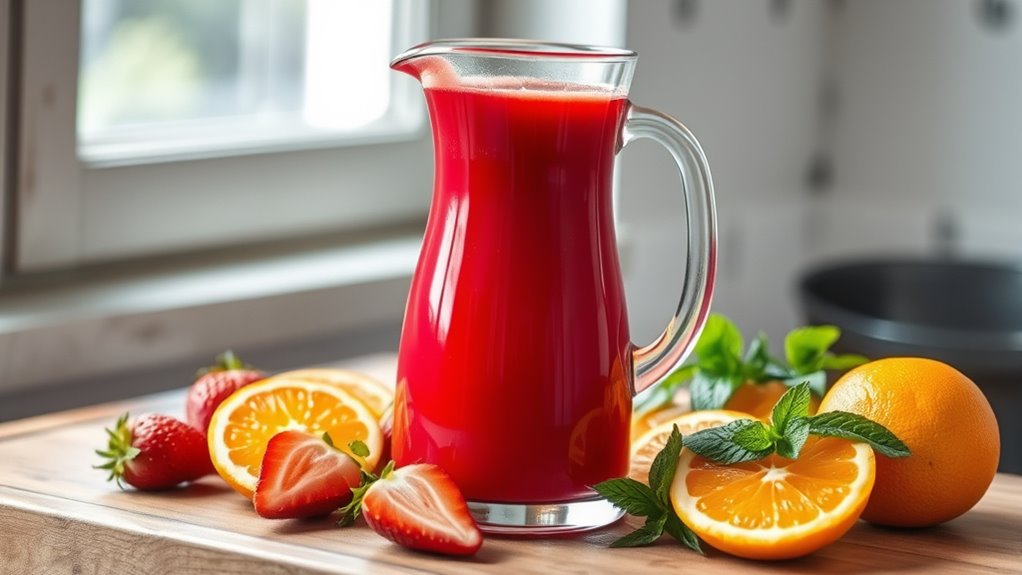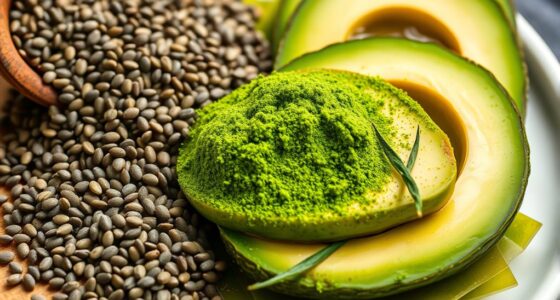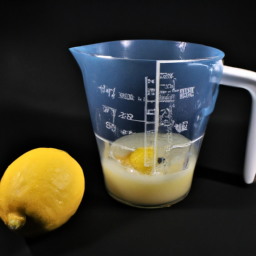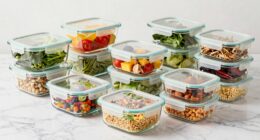Choosing low-sugar juices can help you manage weight by reducing calorie intake and stabilizing blood sugar levels, which prevents cravings. Opt for fruits like berries, citrus, or green apples, and create your own drinks at home with fresh ingredients. Watching portions and avoiding added sugars keeps your intake in check. Incorporating these nutritious drinks into your daily routine supports a balanced diet. Keep exploring to discover tasty recipes and tips for making the most of low-sugar juices.
Key Takeaways
- Choose berries, citrus, and green apples for naturally low-sugar juice options.
- Incorporate high-fiber greens and herbs to enhance satiety and nutrient content.
- Practice portion control and measure servings to prevent excess calorie intake.
- Use cold-pressed methods and proper storage for maximum nutrient retention.
- Consume juices between meals or before exercise to support weight management and hydration.
Benefits of Choosing Low-Sugar Juices for Weight Control

Choosing low-sugar juices can considerably aid your weight management efforts. By reducing sugar content, you avoid unnecessary calorie intake that can hinder your goals. Low-sugar options help regulate blood sugar levels, preventing spikes that lead to cravings and overeating. These juices often retain more of the natural nutrients, offering health benefits like vitamins, antioxidants, and hydration without the added empty calories. Incorporating high fiber content from leafy greens and other ingredients can further improve digestion and satiety. Additionally, selecting juices with minimal processing ensures you receive more of the natural health benefits without added preservatives or artificial ingredients. Consistently choosing low-sugar juices supports a sustainable approach to weight control, making it easier to stick to your dietary habits. Moreover, these juices can help maintain consistent blood sugar levels, reducing fluctuations that contribute to hunger and energy dips. Consuming juices with natural ingredients can enhance overall health and reduce reliance on processed beverages. Plus, they can satisfy your taste buds while helping you maintain a healthier lifestyle. Overall, choosing low-sugar juices not only promotes weight management but also enhances your overall health and well-being.
Top Fruits for Naturally Low-Sugar Juices

You can enjoy low-sugar juices by choosing fruits like berries, which are packed with antioxidants and add natural sweetness without extra calories. Citrus fruits, such as oranges and grapefruits, offer a revitalizing, tangy flavor that keeps sugar levels in check. Incorporating these fruits into your juices helps support your weight management goals while satisfying your taste buds. Additionally, selecting proper installation and venting can help prevent gas buildup and ensure safe operation, making your juice preparation area safer and more efficient. Understanding nutritional information can further guide you in making healthier choices that align with your wellness goals. Recognizing relationship dynamics can also improve your overall well-being and support healthier lifestyle choices.
Berries: Antioxidant Powerhouses
Berries are among the best fruits for naturally low-sugar juices because they pack a powerful antioxidant punch without adding excessive sweetness. Their berry antioxidants help protect your cells and boost your health, all while maintaining fruit purity. When you choose berries like strawberries, blueberries, or raspberries, you’re selecting a vibrant, nutrient-dense option. Imagine the vivid colors and juicy textures:
| Fruit Type | Color |
|---|---|
| Strawberries | Bright red |
| Blueberries | Deep blue |
| Raspberries | Rich red |
| Blackberries | Dark purple |
| Cranberries | Crimson |
These fruits deliver maximum antioxidant benefits, making them perfect for low-sugar juices that support weight management without sacrificing flavor or nutrition. Additionally, selecting these berries allows you to enjoy a low-sugar content that complements your health goals.
Citrus: Refreshing and Tangy
Citrus fruits are naturally tangy and invigorating, making them an excellent choice for low-sugar juices that support weight management. Their citrus antioxidants help boost your immune system while keeping sugar content low. The tangy flavor of citrus adds a vibrant, revitalizing taste without the need for added sugars or artificial ingredients. Oranges, grapefruits, lemons, and limes are perfect options, offering a crisp, invigorating experience with every sip. These fruits are low in calories but high in nutrients, making them ideal for a healthy, satisfying beverage. Incorporating citrus into your juice routine can help curb sweet cravings and keep your weight management on track. Pimple patches are another effective skincare option for targeted treatment of blemishes. Enjoy a glass of freshly squeezed citrus juice for a tangy, healthful boost anytime, and explore sound design techniques to enhance your understanding of creating engaging audio experiences. Additionally, selecting the right electric bike conversion kit can make your commuting more efficient and eco-friendly, aligning with a healthy lifestyle. Incorporating proper air quality in your environment can also contribute to overall health and well-being. Furthermore, participating in remote hackathons can foster innovative approaches to health and wellness technology, potentially leading to new solutions for monitoring or improving health behaviors.
How to Make Your Own Low-Sugar Fruit Juices at Home

Making low-sugar fruit juices at home is easier than you might think. Start by selecting fresh, ripe fruits that naturally contain less sugar, like berries or green apples. Wash and chop your fruits, then blend them until smooth. To keep the juice fresh, use airtight containers to promote proper fruit preservation and prevent spoilage. If you prefer a clear juice, strain the mixture through a fine sieve or cheesecloth. To avoid added sugars, skip sweeteners and rely on the fruit’s natural sweetness. Incorporating cold-pressed techniques can help retain more nutrients and maximize health benefits. Using proper juice packaging and storage techniques can further prolong the quality of your homemade juices and prevent spoilage. Store your homemade juice in the refrigerator for up to 24-48 hours, ensuring it’s kept cold and sealed tightly. Proper juice storage extends freshness and preserves nutrients, making your low-sugar beverage both tasty and healthy. Additionally, choosing freshly squeezed citrus can enhance flavor without increasing sugar content.
Tips for Reading Labels and Choosing Low-Sugar Options

When choosing low-sugar options, reading labels carefully is essential to avoid hidden sugars and make healthier choices. Start by checking the nutrition facts panel for total sugar content; aim for products with less than 5 grams per serving. Pay attention to ingredients lists, as sugars can hide under names like high fructose corn syrup, cane sugar, or agave syrup. When reading labels, compare brands to find the lowest sugar options. Be cautious of marketing claims like “reduced sugar,” which may still contain significant amounts. Choose beverages with minimal added sugars and more natural ingredients. Being aware of mammography guidelines can also help you stay informed about health screening practices that may influence your overall wellness decisions. Additionally, understanding pinball machine weights can be useful if you’re considering home installation or maintenance of recreational equipment. By developing a habit of reading labels diligently, you’ll better identify low-sugar juices that support your weight management goals while satisfying your taste buds.
Incorporating Low-Sugar Juices Into a Balanced Diet

Incorporating low-sugar juices into a balanced diet involves more than just choosing the right beverages; it requires integrating them thoughtfully alongside a variety of nutrient-rich foods. To do this effectively, you should focus on calorie counting to keep your overall intake in check. Using portion control helps prevent overconsumption, ensuring you enjoy the benefits of low-sugar juices without excess calories. Pair your juices with high-fiber foods, lean proteins, and healthy fats to create a well-rounded meal. Remember, even healthy drinks can add up if consumed in large quantities, so measure your servings carefully. By balancing your intake and paying attention to portions, you can enjoy low-sugar juices as part of a sustainable, weight-conscious diet.
Best Time to Enjoy Low-Sugar Juices for Maximum Benefits

To maximize the benefits of low-sugar juices, timing your consumption strategically can make a significant difference. Drinking them between meals helps optimize digestion and prevent unnecessary calorie intake, supporting your weight management goals. Incorporate low-sugar juices into your meal timing—such as during breakfast or as a midday refresh—so you can enjoy their hydration benefits without risking blood sugar spikes. Consuming these juices before exercise can also boost hydration and energy levels, enhancing your workout. Avoid drinking low-sugar juices late at night, as this may interfere with sleep and lead to unwanted hunger later. By being mindful of when you enjoy these beverages, you can better leverage their hydration benefits while supporting your overall health and weight management efforts.
Creative Recipes for Flavorful Low-Sugar Beverages

Getting creative with low-sugar beverages allows you to enjoy flavorful drinks without compromising your health goals. Experimenting with fruit pairing can enhance natural sweetness and add depth to your drinks. For example, combine berries with cucumber for a revitalizing twist or pair citrus with mint for a zesty boost. Using herbs and spices like cinnamon or basil can further elevate flavor without extra sugar. To maximize flavor enhancement, try blending tropical fruits like pineapple with a splash of lime, or mix stone fruits such as peaches with a hint of ginger. These combinations not only taste great but also keep sugar content low. Remember, balancing ingredients is key to creating vibrant, satisfying beverages that support your weight management journey.
Potential Pitfalls and How to Avoid Overconsumption

While low-sugar juices are healthier options, it’s easy to fall into the trap of overconsumption, which can undermine your weight management efforts. To avoid this, practice portion control by measuring your servings and sticking to recommended amounts. Even low-sugar juices contain natural sugars, so drinking too much can still spike your sugar content and calorie intake. Be mindful of your overall consumption throughout the day, and don’t rely solely on juice to satisfy your hydration or snack needs. Reading labels helps you track sugar content and avoid hidden added sugars. Incorporating these habits guarantees you enjoy the benefits of low-sugar juices without risking weight gain or sabotaging your health goals.
Frequently Asked Questions
Are Low-Sugar Juices Suitable for People With Diabetes?
If you’re wondering whether low-sugar juices are suitable for diabetes management, they can help with blood sugar control when consumed carefully. These juices contain less sugar, reducing spikes in your blood sugar levels. However, you should still monitor your intake and consult your healthcare provider, as individual responses vary. Incorporating low-sugar juices thoughtfully can support your efforts to maintain stable blood sugar levels and improve overall diabetes management.
How Do Low-Sugar Juices Compare to Diet Sodas?
When comparing low-sugar juices to diet sodas, you notice they both aim to reduce calorie intake, but their flavor profiles differ. Low-sugar juices often retain natural fruit flavors through careful ingredient sourcing, making them more satisfying. Diet sodas rely on artificial sweeteners, which can alter taste. If you prefer a more natural taste and fewer artificial ingredients, low-sugar juices may be a better choice for you.
Can Low-Sugar Juices Help Reduce Overall Calorie Intake?
You might wonder if low-sugar juices can help with calorie reduction and weight control. They can be a better choice than sugary drinks because they typically contain fewer calories, making it easier to cut down your overall calorie intake. By replacing high-calorie beverages with low-sugar options, you support your weight management goals while still enjoying a flavorful drink. Just be mindful of portion sizes to maximize calorie reduction benefits.
Are There Any Artificial Sweeteners in Commercial Low-Sugar Juices?
Ever wonder if your “low-sugar” juice is hiding artificial sweeteners? It’s a sneaky game where natural sugars get replaced with artificial ones to keep the sweetness intact. Many commercial low-sugar juices do contain artificial sweeteners, like aspartame or sucralose, to cut calories without sacrificing flavor. So, if you’re aiming to avoid these additives, always check the labels — because what’s natural in the bottle might not be so natural after all.
How Long Can Homemade Low-Sugar Juices Be Stored Safely?
You can typically store homemade low-sugar juices safely for 24 to 48 hours in the refrigerator. Keep an eye on spoilage indicators like sour smell, cloudiness, or mold growth. To extend storage duration, consider using airtight containers and refrigeration. If you notice any signs of spoilage, it’s best to discard the juice to prevent health risks. Proper storage helps maintain freshness and safety for those short-term periods.
Conclusion
Choosing low-sugar juices can transform your weight management journey, turning simple sips into powerful allies. Imagine each glass as a step closer to a healthier you, fueling your body without the sugar rush. By making smart choices and savoring these beverages mindfully, you’re not just quenching thirst—you’re nurturing your future self. Embrace this delicious change, and watch how every drop becomes a proof of your commitment and hope for a vibrant, balanced life.









